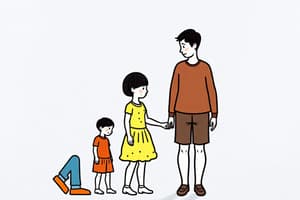Podcast
Questions and Answers
What significant aspect influenced Erikson's quest for identity during his upbringing?
What significant aspect influenced Erikson's quest for identity during his upbringing?
- His father's career in psychoanalysis
- His mother's financial stability
- His rejection by German peers due to his Jewish heritage (correct)
- His training in child-rearing practices
Who played a vital role in Erikson's psychoanalytic training?
Who played a vital role in Erikson's psychoanalytic training?
- Sigmund Freud
- Carl Jung
- Carl Rogers
- Anna Freud (correct)
What was one of Erikson's contributions to psychoanalysis?
What was one of Erikson's contributions to psychoanalysis?
- He placed importance on social influences (correct)
- He emphasized the importance of fantasy over reality
- He focused solely on childhood experiences
- He ignored social influences
Which practice was part of Erikson's private psychoanalytic work?
Which practice was part of Erikson's private psychoanalytic work?
What unique aspect of Erikson's family background affected his personal identity formation?
What unique aspect of Erikson's family background affected his personal identity formation?
What is considered a psychological strength that emerges from satisfactorily resolving a stage in Erikson's theory?
What is considered a psychological strength that emerges from satisfactorily resolving a stage in Erikson's theory?
What does maladaptive coping in Erikson's model typically lead to?
What does maladaptive coping in Erikson's model typically lead to?
At which stage in Erikson's theory does an individual primarily develop a sense of identity?
At which stage in Erikson's theory does an individual primarily develop a sense of identity?
Which basic weakness is associated with the stage of autonomy versus shame and doubt?
Which basic weakness is associated with the stage of autonomy versus shame and doubt?
What is the main crisis faced during the intimacy versus isolation stage?
What is the main crisis faced during the intimacy versus isolation stage?
Which option describes a likely outcome if a stage is not satisfactorily resolved?
Which option describes a likely outcome if a stage is not satisfactorily resolved?
Which basic weakness is identified in the latency stage?
Which basic weakness is identified in the latency stage?
What does the term 'ego integrity' refer to in Erikson's last stage of development?
What does the term 'ego integrity' refer to in Erikson's last stage of development?
What basic strength is developed during the Genital Stage (3-5 years)?
What basic strength is developed during the Genital Stage (3-5 years)?
Which term describes the feelings of inadequacy resulting from inadequate praise during the Latency Stage (6-11 years)?
Which term describes the feelings of inadequacy resulting from inadequate praise during the Latency Stage (6-11 years)?
At what age range does the Identity vs. Role Confusion stage occur?
At what age range does the Identity vs. Role Confusion stage occur?
What is the primary basic strength associated with the Intimacy vs. Isolation stage (19-35 years)?
What is the primary basic strength associated with the Intimacy vs. Isolation stage (19-35 years)?
In the Generativity vs. Stagnation stage (35-55 years), what does generativity primarily involve?
In the Generativity vs. Stagnation stage (35-55 years), what does generativity primarily involve?
What leads to feelings of despair in the Ego Integrity vs. Despair stage (55 years to end of life)?
What leads to feelings of despair in the Ego Integrity vs. Despair stage (55 years to end of life)?
Which of the following is NOT a characteristic of the latency stage (6-11 years)?
Which of the following is NOT a characteristic of the latency stage (6-11 years)?
What outcome is associated with feelings of isolation during the Intimacy vs. Isolation stage (19-35 years)?
What outcome is associated with feelings of isolation during the Intimacy vs. Isolation stage (19-35 years)?
Which maladaptation is associated with the latency stage of development?
Which maladaptation is associated with the latency stage of development?
What term refers to the negative outcome of the young adult stage, according to the outlined theories?
What term refers to the negative outcome of the young adult stage, according to the outlined theories?
What is the fundamental task associated with the genital stage of development?
What is the fundamental task associated with the genital stage of development?
Which pairing corresponds to the struggles of the adolescence stage?
Which pairing corresponds to the struggles of the adolescence stage?
In the context of personality development, which concept focuses on an individual's choices and experiences shaping their character?
In the context of personality development, which concept focuses on an individual's choices and experiences shaping their character?
What maladaptive tendency is associated with failure in the adult stage of development?
What maladaptive tendency is associated with failure in the adult stage of development?
Which concept is NOT typically associated with the optimism of development across the lifespan?
Which concept is NOT typically associated with the optimism of development across the lifespan?
During which life stage is the concept of 'presumption' reflected as a maladaptive outcome?
During which life stage is the concept of 'presumption' reflected as a maladaptive outcome?
What concept is emphasized as part of the theory of personality and development?
What concept is emphasized as part of the theory of personality and development?
Which stage of development is specifically mentioned as an identity crisis period?
Which stage of development is specifically mentioned as an identity crisis period?
What is one criticism noted regarding the theories of personality and development?
What is one criticism noted regarding the theories of personality and development?
In Schultz & Schultz's theories, which element influences personality development significantly?
In Schultz & Schultz's theories, which element influences personality development significantly?
According to the theories, which of the following is NOT considered a part of psychosocial development?
According to the theories, which of the following is NOT considered a part of psychosocial development?
Which theory is mentioned as an extension of Freud's ideas?
Which theory is mentioned as an extension of Freud's ideas?
Which aspect is highlighted as a necessary focus for practitioners in these theories?
Which aspect is highlighted as a necessary focus for practitioners in these theories?
What identity-related issue is part of adolescent development as per the theories discussed?
What identity-related issue is part of adolescent development as per the theories discussed?
What does the lifespan approach to personality focus on?
What does the lifespan approach to personality focus on?
Which theorist is associated with self-actualization theory?
Which theorist is associated with self-actualization theory?
Which of the following theorists is best known for reinforcement theory?
Which of the following theorists is best known for reinforcement theory?
What is one of the basic weaknesses in Erikson's psychosocial stages?
What is one of the basic weaknesses in Erikson's psychosocial stages?
Which cognitive theorist is known for the development of cognitive theory?
Which cognitive theorist is known for the development of cognitive theory?
Which approach to personality emphasizes the importance of social learning?
Which approach to personality emphasizes the importance of social learning?
Which individual is associated with the five-factor theory of personality?
Which individual is associated with the five-factor theory of personality?
Which of the following is NOT a focus of Erik Erikson's identity theory?
Which of the following is NOT a focus of Erik Erikson's identity theory?
Flashcards
Erikson's Quest for Identity
Erikson's Quest for Identity
Erikson's early life was marked by uncertainty about his origins and belonging, leading to a lifelong search for identity due to his mixed heritage and rejection by both German and Jewish communities.
Impact of Anna Freud on Erikson
Impact of Anna Freud on Erikson
Anna Freud, a prominent psychoanalyst, trained Erikson and served as his mentor. Her influence significantly shaped Erikson's understanding of psychoanalysis and its role in shaping personality.
Erikson's Study of Sioux Indians
Erikson's Study of Sioux Indians
To understand the role of cultural influences on child development, Erikson immersed himself in the Sioux culture, studying their child-rearing practices.
Erikson's Focus on Social Influences
Erikson's Focus on Social Influences
Signup and view all the flashcards
Erikson's Intellectual Partnership
Erikson's Intellectual Partnership
Signup and view all the flashcards
Lifespan Approach
Lifespan Approach
Signup and view all the flashcards
Psychosocial Stages (Erikson)
Psychosocial Stages (Erikson)
Signup and view all the flashcards
Basic Weaknesses (Erikson)
Basic Weaknesses (Erikson)
Signup and view all the flashcards
Questions About Human Nature (Erikson)
Questions About Human Nature (Erikson)
Signup and view all the flashcards
Assessment in Erikson's Theory
Assessment in Erikson's Theory
Signup and view all the flashcards
Research on Erikson's Theory
Research on Erikson's Theory
Signup and view all the flashcards
Psychoanalytic Approach
Psychoanalytic Approach
Signup and view all the flashcards
Neo-psychoanalytic Approach
Neo-psychoanalytic Approach
Signup and view all the flashcards
Guilt
Guilt
Signup and view all the flashcards
Initiative vs. Guilt
Initiative vs. Guilt
Signup and view all the flashcards
Industry vs. Inferiority
Industry vs. Inferiority
Signup and view all the flashcards
Identity vs. Role Confusion
Identity vs. Role Confusion
Signup and view all the flashcards
Intimacy vs. Isolation
Intimacy vs. Isolation
Signup and view all the flashcards
Generativity vs. Stagnation
Generativity vs. Stagnation
Signup and view all the flashcards
Ego Integrity vs. Despair
Ego Integrity vs. Despair
Signup and view all the flashcards
Basic Strength
Basic Strength
Signup and view all the flashcards
Erikson's Stages
Erikson's Stages
Signup and view all the flashcards
Psychosocial Crisis
Psychosocial Crisis
Signup and view all the flashcards
Adaptive Coping
Adaptive Coping
Signup and view all the flashcards
Maladaptive Coping
Maladaptive Coping
Signup and view all the flashcards
Ego Balance
Ego Balance
Signup and view all the flashcards
Stage Strength
Stage Strength
Signup and view all the flashcards
Interdependence of Strengths
Interdependence of Strengths
Signup and view all the flashcards
Maldevelopment
Maldevelopment
Signup and view all the flashcards
Case Study Method
Case Study Method
Signup and view all the flashcards
Erikson's Theory
Erikson's Theory
Signup and view all the flashcards
Identity Crisis
Identity Crisis
Signup and view all the flashcards
Generativity
Generativity
Signup and view all the flashcards
Trust & Security
Trust & Security
Signup and view all the flashcards
Maturity
Maturity
Signup and view all the flashcards
Ethnic Identity
Ethnic Identity
Signup and view all the flashcards
Gender Preference
Gender Preference
Signup and view all the flashcards
Trust vs. Mistrust
Trust vs. Mistrust
Signup and view all the flashcards
Autonomy vs. Shame & Doubt
Autonomy vs. Shame & Doubt
Signup and view all the flashcards
Study Notes
Erik Erikson's Identity Theory
- Erikson's theory of psychosocial development examines personality development across a person's lifespan.
- It suggests that personality develops through a series of eight psychosocial stages, each characterized by a specific conflict or crisis that must be resolved for healthy development to occur.
- Each stage builds upon the previous one and is influenced by both innate biological factors and environmental factors.
- The key concept is the epigenetic principle, implying that each stage is predetermined but unfolds sequentially.
Use of PPT Slides
- Download the PPT slides for comprehensive notes.
- Attached companion notes supplement many slides within the presentation.
- The presentation is a condensed version of the chapter reading, including audio/video links, and is not intended as a direct replacement for the required reading.
- Click on audio/video icons for associated recordings.
Use of PPT Slides Continued
- Some slides may contain interactive links, possibly leading to online learning activities within the module folder.
- If web links are broken, copy and paste them into a new browser.
- Contact IT Services Help Desk (519-452-4430 ext. 4357) for technical support.
Approaches to Personality Development
- Psychoanalytic: Sigmund Freud
- Neo-psychoanalytic: Karen Horney, Alfred Adler
- Behavioral: B.F. Skinner
- Cognitive: Aaron Beck
- Humanistic: Carl Rogers, Martin Seligman
- Genetics (Trait): McCrae & Costa, Marvin Zuckerman
- Social-Learning: Julian Rotter
- Cognitive-behavioral:
Lifespan Approach
- This approach examines personality development through the changes observed across an individual's entire life.
Erikson's Quote
- Hope is a fundamental and essential virtue in human existence.
Chapter Outline
- The chapter, likely covering Erikson's theory, comprises sections on Erikson's life, stages of personality development, basic weaknesses, considerations of human nature, assessment methods, research methods and reflections.
Erikson's Life
- Born in 1902, died in 1994.
- Born in Germany
- Mother gave birth out of wedlock
- Raised by a stepfather whom he thought was his biological father
- Faced rejection by his peers due to his Jewish heritage and Nordic appearance.
- Experienced a quest for identity.
- Trained in psychoanalysis, analyzed by Anna Freud.
- Placed importance on social influences.
- Wife became his intellectual partner and editor.
- Established a private psychoanalytic practice.
- Studied child-rearing practices of Sioux Indians.
Epigenetic Principle
- Development is governed by the sequence of predetermined stages.
- Development relies on genetic factors.
- Each stage represents a critical turning point in development.
Psychosocial Stages
- Trust vs. Mistrust (Birth-1 year): Healthy development hinges on consistent caregiver interaction. Mistrust arises from inconsistency and fear.
- Autonomy vs. Shame & Doubt (2-3 years): Children develop independence and self-reliance. Shame and doubt emerge from limited opportunities for independence.
- Initiative vs. Guilt (3-5 years): Children initiate activities and understand social norms. Guilt results from overly strict social expectations.
- Industry vs. Inferiority (6-11 years): Children develop competence through social and academic experiences. Inferiority arises from failure to achieve competence.
- Identity vs. Role Confusion (12-18 years): Adolescents develop a sense of self and belonging. Role confusion results from the lack of direction and a clear sense of self.
- Intimacy vs. Isolation (19-35 years): Young adults form close relationships, establishing committed, caring relationships or experiencing isolation.
- Generativity vs. Stagnation (35-55 years): Adults contribute to the future through teaching and mentoring or experience stagnation.
- Ego Integrity vs. Despair (55+ years): Older adults reflect on their lives, feeling satisfaction or despair regarding their accomplishments.
Stages Table
- A table details the stage, age, issue, relational focus, central question asked, and associated virtues for each stage of Erikson's psychosocial development.
Coping Mechanisms
- Each stage involves coping mechanisms, including both positive and negative methods.
Resolution of Stages
- Stage resolutions are not permanent.
- Interdependent strengths are crucial across stages.
- Resolution leads to significant life strengths.
Maldevelopment
- Ego development relies on a single coping method.
Basic Weaknesses in the Stages
- Each stage is accompanied by potential weaknesses.
Assessment Methods
- Play therapy is a cornerstone assessment method.
- Anthropological studies and psychohistorical analysis contribute to the understanding of life themes.
Research Focus
- A research focus employs a case study method, addressing aspects such as play constructions, trust and security, and psychosocial stages of development.
Reflection on Erikson's Theory
- Erikson's theory expands upon Freud's work, offering a lifespan perspective on personality development.
- Identity crisis becomes a significant focus during adolescence.
- Erikson's theory acknowledges and considers cultural and historical influences.
- It provides useful concepts for practitioners working with individuals.
Criticisms of Erikson's Theory
- Ambiguity in his concepts and definitions of maturity are potential drawbacks.
- The theory may lack sufficient emphasis on negative aspects of aging.
- The theory needs careful scrutiny when applying it to women or those in economically disadvantaged circumstances.
Additional Resources
- Links to supplementary articles and online resources offer further information.
Studying That Suits You
Use AI to generate personalized quizzes and flashcards to suit your learning preferences.
Related Documents
Description
Explore the key aspects of Erik Erikson's life that shaped his theories on identity. This quiz delves into his upbringing, psychoanalytic training, contributions to the field, and the unique influences from his family background. Test your understanding of Erikson's impact on psychoanalysis and identity formation.




